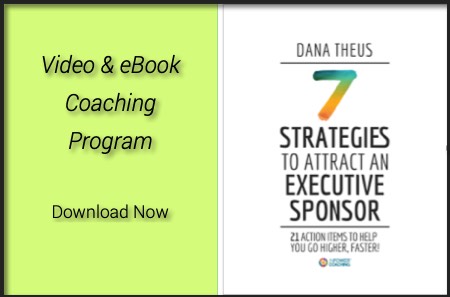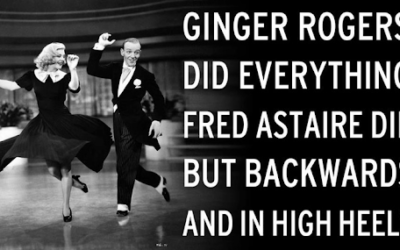We get a lot of questions about how to find a sponsor to advocate for you behind the scenes. This post by Kathryn (and the book she reviews) will give you a lot of insight into this important career strategy. – InPower Editors
At a recent 85 Broads Power Circle event, I indeed felt the power of women sharing wisdom and ideas. The featured guest was Sylvia Ann Hewlett, author of the new book creating a lot of buzz in the business world: Forget a Mentor, Find A Sponsor. It warrants a lot of buzz in the world outside business, too.
As the founding president of the Center for Talent Innovation, a nonprofit think tank, Sylvia chairs a task force of 75 global companies focused on fully realizing the new streams of high echelon labor in the global marketplace. Her work, overall, dissects a lot of complex issues, but her book’s simple message is that mentors can be a shoulder to lean on, while sponsors actually give you a full leg up on your career or passionate life pursuit.
More specifically, Sylvia describes sponsors as people who deliver “high octane advocacy”. Once you’ve proven your personal and organizational value to a sponsor, they go out on a limb for you, advocate for your next promotion and provide “air cover” so that you can take risks. In return, you’re expected to deliver high performance on the job, maintain loyalty and grow the sponsor’s scope and span through your own personal brand. In Sylvia’s words: “the best sponsor candidates are people in a position to get you where you’re keen on going—people inside or outside of your company who have clout in the circle you aspire to join or influence in the community you’re eager to embrace.”
As you read Sylvia’s book and think about all the compelling case study examples, it becomes clear that there’s more high-profile sponsorship than underhanded “politics” involved in getting ahead. It’s not that a person is “in” with this one or that one for some superfluous reason—it’s that men and women who get promotions and plum opportunities earn the right to bark up the right professional tree.
It’s safe to say that most of the 85 Broads members listening to Sylvia’s advice were women currently generating paychecks in the workforce. The book is billed as “The New Way to Fast-Track Your Career”, and it seems likely that most of Sylvia’s readers will come from the “career women” demographic. Though a word or two on the book’s back cover asserts that her seven-step map to sponsorship also applies to a volunteer running a community campaign, I want to emphasize that her important message should be fully absorbed by women at all ages and stages—both in and out of the workforce.
Readers of my “Climbing the Ladder” blog posts—those actively engaged in building resumes–will immediately see how sponsors can advance their career. But I want to make sure that readers in other “9 Lives” categories think about cultivating sponsors, too. Some possible scenarios could be:
- Sponsors for women who are new college graduates (who perhaps knew them during summer jobs or in the college classroom) to help position strengths and land first jobs.
- Sponsors for women early in their careers who can help them navigate the often confusing and daunting world of work—and get the right training or assignments to move beyond the entry-level.
- Sponsors for women on the job hunt—especially those who have had a frustrating or prolonged search—to “sell” resumes to the hiring managers that count.
- Sponsors for women who have one foot on the off ramp—and are trying to create a more flexible schedule—to speak for their work ethic and productivity and break down barriers held fast by narrow-minded, traditional thinking managers. (Sylvia actually gives a great example of this in her book.)
- Sponsors for women who decide to leave the workforce and in turn become “mega-volunteers”—to help them find highly visible leadership positions that continue to develop their business skills and facilitate encore careers.
- Sponsors for women who want to return to the workforce (perhaps the same sponsors who have helped them land those volunteer leadership positions) to vouch for and promote still active skills, despite a hiatus from the paid workforce.
- Sponsors for women who are looking for a career reinvention or ways to fend off retirement—to enlist support from community or professional groups for a new business idea, gain credibility in a new industry or generate interest in consulting services for a particular area of expertise.
Few would argue that a sponsor can be a great asset, but many will say where are they to be found? When you and your sponsor are working in the same company, opportunities are often right in front of you to hold up your end of the bargain and be an asset to your sponsor, too. When you’re not in the same office, you have to seek out ways to increase your visibility in your community and your profession—opportunities where you can showcase your expertise, prove your value and show your willingness to give before you get.
To some the process of finding or attracting a sponsor may seem too deliberate or forced. Some may think that with good, hard work smart women should be able to make it on their own. But when you read Sylvia’s book, you’ll see that hard work is not enough. People are propelled forward through sponsorship–genuine relationships that evolve through shared purpose, vision, respect and authenticity. It’s a practice that is tried and true: in the history of the world, so many have prospered from exchanging influential currency and the fundamental, “you help me and I’ll help you”. –KAS
Originally posted on: 9 Lives For Women
Free Advice for Mentoring Women
Tropes and truths to help mentors and proteges navigate workplace biases and outdated advice.







